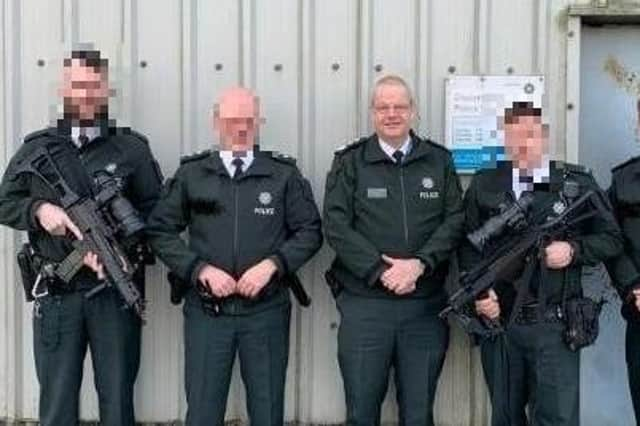Owen Polley: It is not only Simon Byrne who feels the need to appease Sinn Fein, but the highest echelons of government do too


These facts emerged as Simon Byrne faced an emergency meeting of the Policing Board on Thursday, after a High Court judge confirmed that two of his junior officers were disciplined due to political pressure from Sinn Fein.
It’s difficult to exaggerate the scale of the failings, both institutional and personal, that this case highlighted in Mr Byrne’s leadership.
Advertisement
Hide AdAdvertisement
Hide AdThe chairman of the Police Federation, Liam Kelly, said that he was “disgusted, disillusioned and extremely angry” at the suggestion that there could be an appeal. He was merely reflecting the mood of ordinary police officers, who can now have little confidence that senior colleagues will back them so long as they do their jobs conscientiously and fairly. Initially, the chief constable claimed that he would accept the court’s verdict, delivered by Mr Justice Scoffield last Tuesday.
In his summing up, the judge found that one officer was suspended and the other ‘repositioned’, not because they had done anything wrong, but because Sinn Fein reacted furiously after a man was arrested for disorderly conduct, during a commemoration of the Sean Graham bookmaker shooting on the Ormeau Road.
This commemoration took place in 2021, at the height of coronavirus regulations, which the officers were required to enforce.
The decision to discipline them was taken, because, “both the deputy chief constable and the chief constable were acutely aware of the threat of Sinn Féin withdrawing support for policing and/or withdrawing from the Policing Board if immediate action was not taken in respect of the officers’ duty status”.
Advertisement
Hide AdAdvertisement
Hide AdThe PSNI barrister’s main argument did not exactly dispel this suggestion, by insisting that the chief constable had defused an incident that jeopardised wider ‘public confidence’ in policing in Northern Ireland.
That line is hardly at odds with unionists’ interpretation, which is that Byrne thought that it was in the public interest to appease Sinn Fein, even at the cost of sacrificing two of his own officers unfairly. It seemed to imply that the PSNI’s leadership believed it could not deliver impartial and consistent policing, because it must make a special effort to placate republicans in case they withdrew support.
For that reason, there would have been a furore about the Ormeau Road decision and the subsequent court case even if it had been an isolated incident. But it created particular anger because it seemed to confirm a pattern. Many unionists and loyalists increasingly believe that the chief constable’s idea of ‘political policing’ means continuously appeasing Sinn Fein.
Remember, for example, how he grovelled to republicans, after posing for a photograph outside Crossmaglen police station with heavily armed colleagues on Christmas Day 2019. As some kind of penance for the offence this supposedly caused, Byrne commissioned and endorsed a review based on surveys conducted by the Campaign for Restorative Justice (CRJ).
Advertisement
Hide AdAdvertisement
Hide AdThe former Taoiseach Garrett Fitzgerald, no less, once alleged that this organisation was established by Sinn Fein and accused it of being involved in attempts to intimidate families out of Northern Ireland. The CRJ’s director, Harry Maguire, was convicted of the ‘two corporals’ murder in West Belfast during the Troubles, which sticks in most people’s heads as one of the most horrific, inhuman episodes in thirty years of violence.
The resulting report, which contained all kinds of proposals to placate republicans, was described by Sir Jeffrey Donaldson as “the most politically naïve document ever endorsed by a chief constable”. One recommendation was that memorials to murdered police officers should be moved away from prominent parts of police stations, as they were viewed ‘differently’ by different communities.
This Crossmaglen fiasco, it’s important to stress, started almost six months before the PSNI allowed republicans to flaunt Covid guidelines openly and take over large parts of Belfast, during the massive funeral of IRA henchman, Bobby Storey. The force not only allowed this to happen but facilitated it, according to a report by the Public Prosecution Service.
With such a litany of controversies already taking place under his leadership, it was incredible that Byrne was still chief constable when the data breach this summer effectively handed the personal details of officers and staff to dissident republicans. That he still will not go, after this bombshell court verdict, is scarcely believable.
Advertisement
Hide AdAdvertisement
Hide AdTo be fair, though, the instinct that Mr Byrne feels to appease Sinn Fein is not exclusive to him. It permeates Northern Ireland and Westminster like a wasting disease and reaches the highest echelons of government.
To maintain this phenomenon, republicans must continue to portray themselves as victims of police bias, institutional injustice and state indifference, even as they struggle to contain their glee at having carved out such a privileged position for themselves within our society. The only factor that makes this implausible act effective is the implicit threat that if they are not indulged, violence could return.
While Mr Byrne should certainly go, then, his departure would not necessarily mean a lasting change of culture within the PSNI’s leadership, never mind beyond. At least, though, the force could start to rebuild its reputation for being able to withstand political pressure.
The bigger question for Northern Ireland, is why, so long after the IRA’s ceasefires, we allow an implicit threat of republican violence to shape our society so profoundly.